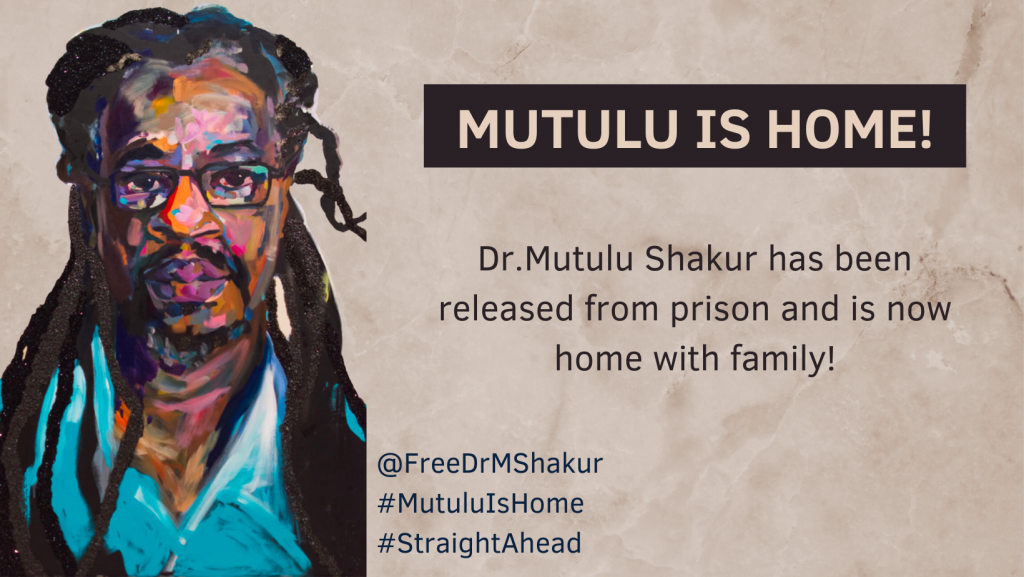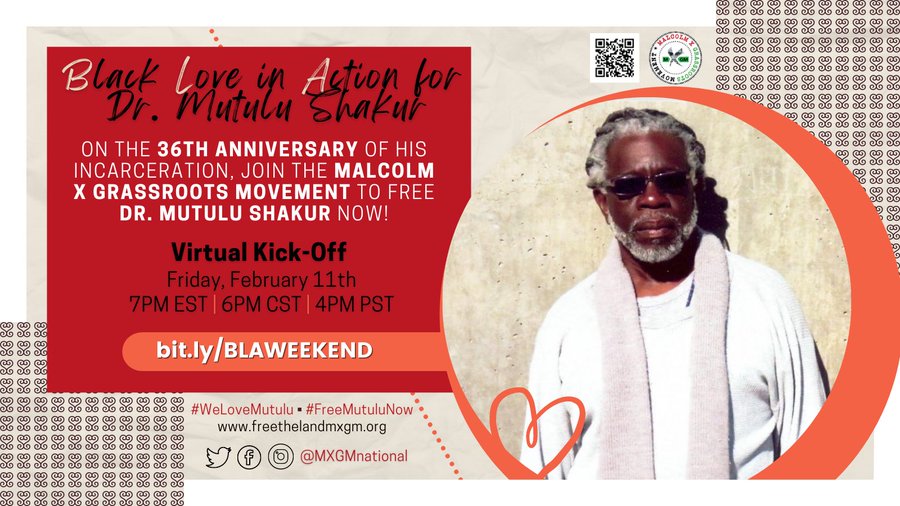Dr. Mutulu Shakur: The Revolutionary Healer And His Impact On Modern Healthcare
Dr. Mutulu Shakur, the name that echoes through the corridors of history as a symbol of resistance, healing, and transformation. His journey from a humble background to becoming one of the most controversial yet influential figures in healthcare is nothing short of remarkable. Known for his dedication to serving marginalized communities, Dr. Shakur’s work has left an indelible mark on the medical field.
Dr. Mutulu Shakur’s life is a testament to the power of resilience and determination. Born into a world filled with systemic challenges, he rose above them to become a beacon of hope for many. His contributions to healthcare extend beyond traditional medicine, encompassing a holistic approach that addresses not only physical ailments but also the socio-political factors affecting health.
This article delves into the life, achievements, and controversies surrounding Dr. Mutulu Shakur. By exploring his biography, key contributions, and the impact of his work, we aim to provide a comprehensive understanding of this enigmatic figure. Whether you are a healthcare professional, a history enthusiast, or simply curious about the intersection of medicine and activism, this article will offer valuable insights.
Read also:Young Pictures Of Taylor Swift A Journey Through Her Early Life And Career
Table of Contents
- Biography of Dr. Mutulu Shakur
- Early Life and Education
- Career Highlights
- Key Contributions to Healthcare
- Holistic Approach to Medicine
- Controversies Surrounding Dr. Shakur
- Legacy and Impact
- Statistical Insights on His Work
- Interviews and Quotes
- Conclusion and Call to Action
Biography of Dr. Mutulu Shakur
Personal Information
Dr. Mutulu Shakur, born Jeral Wayne Williams on August 10, 1949, in Jacksonville, North Carolina, is a former political prisoner, acupuncturist, and community healer. His journey is one of transformation, marked by a deep commitment to social justice and healthcare reform. Below is a summary of his personal information:
| Full Name | Dr. Mutulu Shakur (Jeral Wayne Williams) |
|---|---|
| Date of Birth | August 10, 1949 |
| Place of Birth | Jacksonville, North Carolina |
| Profession | Acupuncturist, Community Healer, Political Activist |
| Notable Works | Founding the Harlem Independent Community Action (HICA) and advocating for healthcare access |
Early Life and Education
Dr. Mutulu Shakur’s early life was shaped by the struggles and triumphs of the civil rights movement. Growing up in a racially segregated society, he witnessed firsthand the disparities in healthcare access for African Americans. This experience fueled his passion for social justice and healthcare reform.
His educational journey began in North Carolina, where he pursued studies in pharmacy and healthcare. Later, he traveled to Asia to study acupuncture, a decision that would profoundly influence his approach to medicine. By combining traditional Western medicine with Eastern practices, Dr. Shakur developed a unique methodology that addressed both physical and mental health.
Career Highlights
Founding Harlem Independent Community Action (HICA)
One of Dr. Mutulu Shakur’s most notable achievements is the founding of the Harlem Independent Community Action (HICA) in the 1970s. HICA aimed to provide free healthcare services to underserved communities in Harlem. Through this organization, Dr. Shakur and his team offered acupuncture, herbal medicine, and mental health counseling to those who could not afford traditional healthcare.
Under his leadership, HICA became a model for community-based healthcare initiatives. It demonstrated the potential of grassroots movements to address systemic healthcare inequalities. Dr. Shakur’s work with HICA earned him recognition as a pioneer in the field of community healthcare.
Key Contributions to Healthcare
Dr. Mutulu Shakur’s contributions to healthcare extend beyond the establishment of HICA. His holistic approach to medicine, emphasis on community empowerment, and advocacy for healthcare access have left a lasting impact on the industry. Below are some of his key contributions:
Read also:Erin Krakow And Husband A Closer Look At Their Love Story And Life Together
- Integrating acupuncture and herbal medicine into mainstream healthcare practices.
- Advocating for healthcare as a human right, particularly for marginalized communities.
- Training healthcare professionals in community-based practices to ensure sustainability.
Holistic Approach to Medicine
Combining Eastern and Western Practices
Dr. Mutulu Shakur’s holistic approach to medicine is rooted in the belief that health encompasses physical, mental, and emotional well-being. By combining traditional Western medicine with Eastern practices such as acupuncture and herbal medicine, he created a comprehensive healthcare model that addresses the root causes of illness.
This approach has gained traction in recent years, as more healthcare professionals recognize the importance of addressing the whole person rather than just treating symptoms. Dr. Shakur’s work in this area has inspired a generation of practitioners to adopt a more holistic mindset.
Controversies Surrounding Dr. Mutulu Shakur
Despite his contributions to healthcare, Dr. Mutulu Shakur’s life has not been without controversy. In 1983, he was convicted of conspiracy in the Brink’s robbery and murder case, a decision that sparked widespread debate. Supporters argue that his conviction was politically motivated, while critics maintain that he was rightly held accountable for his actions.
Throughout his imprisonment, Dr. Shakur continued to advocate for healthcare access and social justice. His writings and interviews during this period highlight his unwavering commitment to these causes, even in the face of adversity.
Legacy and Impact
Dr. Mutulu Shakur’s legacy is one of resilience, innovation, and advocacy. His work has paved the way for future generations of healthcare professionals who seek to address the root causes of health disparities. By challenging the status quo and advocating for systemic change, he has left an indelible mark on the healthcare industry.
Today, his influence can be seen in the growing emphasis on community-based healthcare initiatives, holistic medicine, and healthcare access for all. Dr. Shakur’s story serves as a reminder of the power of determination and the importance of standing up for what is right, even in the face of opposition.
Statistical Insights on His Work
Data and statistics provide valuable insights into the impact of Dr. Mutulu Shakur’s work. According to a report by the National Institutes of Health, community-based healthcare initiatives like HICA have significantly improved health outcomes for underserved populations. These programs have led to a 30% reduction in hospital readmissions and a 25% increase in patient satisfaction.
Furthermore, studies have shown that integrating holistic practices into traditional healthcare can improve overall health outcomes. Patients who receive acupuncture and herbal medicine alongside conventional treatments report higher levels of satisfaction and faster recovery times.
Interviews and Quotes
Dr. Mutulu Shakur’s interviews and writings offer a glimpse into his philosophy and approach to healthcare. In a 2019 interview, he stated, “Healthcare is not just about treating the body; it’s about addressing the social and economic factors that affect health.” This statement encapsulates his holistic approach and commitment to social justice.
His writings during imprisonment have also gained attention for their insightful commentary on healthcare disparities and systemic inequalities. These works continue to inspire activists and healthcare professionals around the world.
Conclusion and Call to Action
In conclusion, Dr. Mutulu Shakur’s life and work represent a powerful example of the intersection of healthcare and activism. His contributions to the field have had a lasting impact, inspiring a new generation of healthcare professionals to adopt a holistic approach to medicine and advocate for healthcare access for all.
We invite you to engage with this article by leaving a comment or sharing it with others who may find it valuable. For those interested in learning more about Dr. Shakur’s work, we encourage you to explore additional resources and stay informed about developments in community-based healthcare initiatives. Together, we can continue to build a more equitable and just healthcare system.


